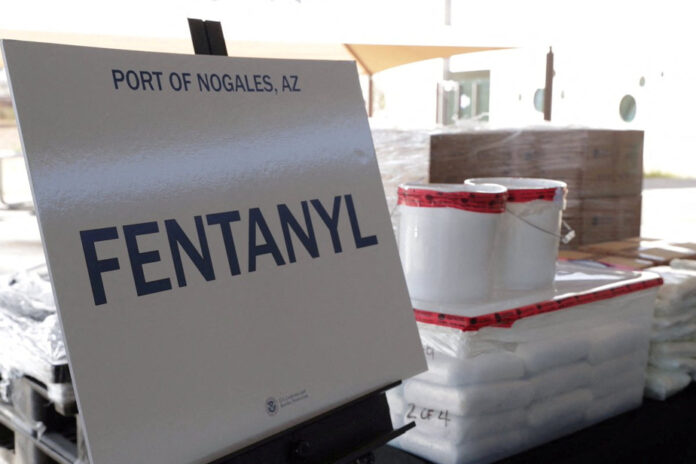(Washington) A new front in the US drug war is opening up – and Canada has a seat at the table to shape the strategy.
Senior officials from President Joe Biden’s cabinet, including Attorney General Merrick Garland and Homeland Security Secretary Alejandro Mayorkas, will be in Ottawa in the coming weeks to discuss an offensive on fentanyl.
The schedule for this year’s Canada-U.S. Cross-Border Crime Forum remains unconfirmed, but the gathering will come after strategic meetings at the White House last week between national security officials and diplomats from the United States, Canada and Mexico.
The main objective, among other law enforcement issues: to address the exponential growth of synthetic opioids, particularly fentanyl, a scourge the White House describes as “the number one drug threat in North America “.
It’s a “shared goal” between Canada and the United States, says Public Safety Minister Marco Mendicino, who will attend the Ottawa meetings alongside Justice colleague David Lametti . “It’s about creating a strong relationship between our two countries in what has become a real crisis,” Mr. Mendicino said.
And while the two countries will always be close partners in shared law enforcement and national security goals, Minister Mendicino said Canada will also advocate for “evidence-based approaches” to add a public health component to this fight.
“Canada also has an important role to play in supporting a public health approach when it comes to reducing the trauma and social harm caused by opioids, including fentanyl trafficking,” he said. .
Last Thursday, US Homeland Security Advisor Elizabeth Sherwood-Randall hosted a meeting at the White House with her Canadian counterpart, Jody Thomas, and with Rosa Icela Rodríguez, Mexico’s security secretary.
They presented a common front on four key elements: current and emerging synthetic drugs, drug demand and public health, the methods of traffickers, and the targeting of their financial operations.
The goal is to disrupt the transfer, facilitation and supply of illicit fentanyl, its chemical precursors and drug-making equipment like pill presses before they can even enter the hemisphere, the agency said. White House.
The Canadian delegation also included US Ambassador Kirsten Hillman and Ramzi Nashef, chief of staff to Prime Minister Justin Trudeau’s national security and intelligence adviser, Jody Thomas.
The challenges for the two countries are decidedly different, if the US approach to law enforcement is to be believed.
A joint Customs and Border Protection and U.S. Border Patrol crackdown that began last month resulted in the seizure of more than 2,200 pounds of fentanyl in the first four weeks alone, the agencies said.
The bulk of this drug entered from Mexico, illustrating how the opioid crisis is politically tied to the pervasive migration challenge the United States has long faced on its southern border.
Police and border officials in Canada have also intercepted large shipments of precursor chemicals to fentanyl and other opioids, which are also considered “controlled substances.”
Last month, Royal Canadian Mounted Police investigators in British Columbia made two arrests and seized precursors equivalent to approximately 262 million doses of fentanyl. In 2021, the Canada Border Services Agency seized a shipment of 1,500 kilograms, the equivalent of two billion doses.
The United States also took several other draconian steps on Friday, including filing charges against Sinaloa cartel traffickers, new Treasury Department sanctions against Chinese suppliers of precursor chemicals, and new multi-million dollar rewards. dollars for information that could lead to the arrest or conviction of 27 known smugglers.
But Mexican President Andrés Manuel López Obrador hasn’t made it easy lately. Last month, he blamed the US crisis on the “disintegration of families” and “the lack of love, brotherhood, hugs and hugs” in the United States. Two weeks ago, he accused the United States of “gross threats” and a “demagogic attitude” in a letter he wrote to Chinese President Xi Jinping, asking that country to block shipments of chemical precursors to fentanyl.
And on Monday, President López Obrador concluded one of his famously drawn-out press conferences with an editorial cartoon depicting a muscle-bound version of Uncle Sam hurling hypodermic syringes at a map of Mexico.
That anger could be fueled by a Republican bill that would target nine of Mexico’s biggest drug cartels and designate them as terrorist organizations — a step critics describe as literally akin to a “war on drugs.” .
The idea has been endorsed by several Republican presidential candidates, including Donald Trump, who as president mused about launching counterterrorism operations in Mexico, before members of his cabinet intervened.


















